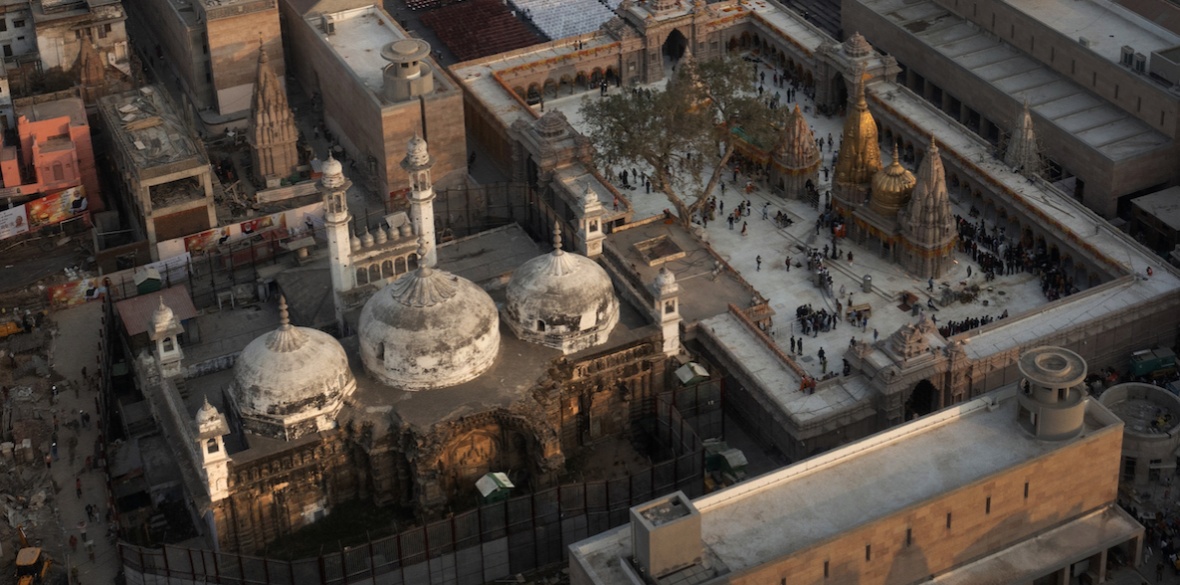Court rules that Varanasi mosque can be surveyed to see if it stands on site of Hindu temple, in move inflaming community tensions

An Aerial view shows Gyanvapi mosque, left, and Kashiviswanath temple on the banks of the river Ganges in Varanasi, India, Dec. 12, 2021.
UTTAR PRADESH’S High Court ruled today that a 17th century mosque in Varanasi may be surveyed to see if a Hindu temple once stood on the site.
The decision will inflame tensions between Hindus and Muslims in the Hindu holy city, which is represented by Indian Prime Minister Narendra Modi in the country’s parliament.
Petitioners’ lawyer Vishnu Shankar Jain said the court ruling meant that the Archaeological Survey of India would survey the structure without damaging it. Chief Justice Pritinker Diwaker said: “Scientific survey is necessary in the interest of justice.”
But the committee of the Gyanvapi mosque said they would appeal to India’s Supreme Court. Spokesman Khalid Rasheed said: “We are hopeful that justice will be done as the mosque is 600 years old and Muslims have been praying there for so long.”
The mosque is at the heart of a separate legal battle with five Hindu women seeking permission to perform Hindu rituals there.
The Anjuman Intezamia Masjid Committee, as the mosque committee is formally known, says the survey will breach Indian laws protecting places of worship.
A 1991 law states that the nature of all places of worship, with one prominent exception which is already central to Hindu-Muslim tensions in India, should be maintained as it was when India became independent in 1947.
The exception is the Ram Janmabhoomi or Babri Masjid, a 16th century mosque razed by a fanatical Hindu mob in 1992 on the grounds that it had once been the site of a temple to the Hindu god Ram or Rama, and indeed his birthplace.
The Supreme Court ruled in 2019 that a Hindu temple could be erected on the site of the razed mosque, and foundation stones were laid by Mr Modi and the head of his BJP party’s street fighter wing the RSS in a ceremony in 2020.
Transferring places of worship between the religions is incendiary and highlights Mr Modi’s push to shift India from a secular state to a specifically Hindu one.
Mosques built under the Muslim Mughal empire, which the government has also been accused of writing out of textbooks, are a target of Hindu nationalists, with surveys like that planned for the Gyanvapi mosque used to justify restoring sites to their “original” use.

An Aerial view shows Gyanvapi mosque, left, and Kashiviswanath temple on the banks of the river Ganges in Varanasi, India, Dec. 12, 2021.
UTTAR PRADESH’S High Court ruled today that a 17th century mosque in Varanasi may be surveyed to see if a Hindu temple once stood on the site.
The decision will inflame tensions between Hindus and Muslims in the Hindu holy city, which is represented by Indian Prime Minister Narendra Modi in the country’s parliament.
Petitioners’ lawyer Vishnu Shankar Jain said the court ruling meant that the Archaeological Survey of India would survey the structure without damaging it. Chief Justice Pritinker Diwaker said: “Scientific survey is necessary in the interest of justice.”
But the committee of the Gyanvapi mosque said they would appeal to India’s Supreme Court. Spokesman Khalid Rasheed said: “We are hopeful that justice will be done as the mosque is 600 years old and Muslims have been praying there for so long.”
The mosque is at the heart of a separate legal battle with five Hindu women seeking permission to perform Hindu rituals there.
The Anjuman Intezamia Masjid Committee, as the mosque committee is formally known, says the survey will breach Indian laws protecting places of worship.
A 1991 law states that the nature of all places of worship, with one prominent exception which is already central to Hindu-Muslim tensions in India, should be maintained as it was when India became independent in 1947.
The exception is the Ram Janmabhoomi or Babri Masjid, a 16th century mosque razed by a fanatical Hindu mob in 1992 on the grounds that it had once been the site of a temple to the Hindu god Ram or Rama, and indeed his birthplace.
The Supreme Court ruled in 2019 that a Hindu temple could be erected on the site of the razed mosque, and foundation stones were laid by Mr Modi and the head of his BJP party’s street fighter wing the RSS in a ceremony in 2020.
Transferring places of worship between the religions is incendiary and highlights Mr Modi’s push to shift India from a secular state to a specifically Hindu one.
Mosques built under the Muslim Mughal empire, which the government has also been accused of writing out of textbooks, are a target of Hindu nationalists, with surveys like that planned for the Gyanvapi mosque used to justify restoring sites to their “original” use.
MORNINGSTAR.UK
No comments:
Post a Comment